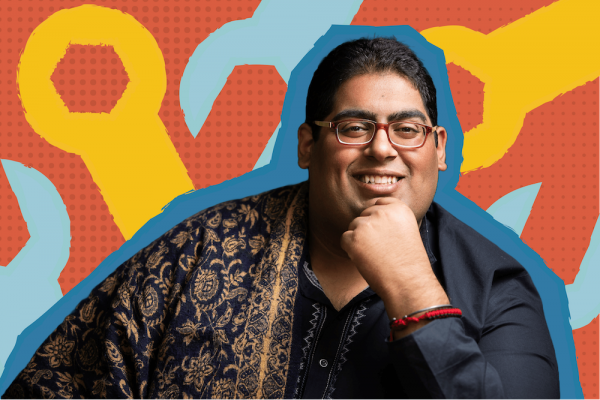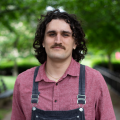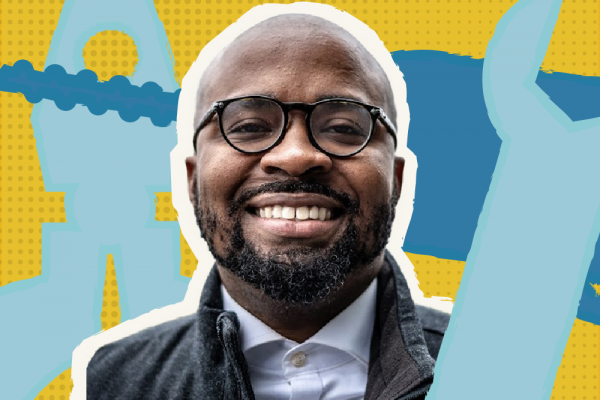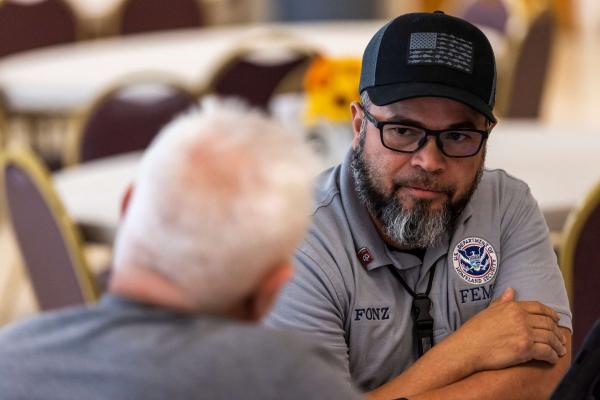This interview is part of The Reconstruct, a weekly newsletter from Sojourners. In a world where so much needs to change, Mitchell Atencio and Josiah R. Daniels interview people who have faith in a new future and are working toward repair. Subscribe here.
I regret to inform you that we are less than a year from the next presidential election.
As we officially enter the season of primaries, advertising campaigns, and debates, faith communities are as central to the election process as they ever have been. Even with the nationwide decline in religiosity and trust in institutions, religious leaders and congregations are central community builders for millions of people in the U.S.
Tahil Sharma, a Hindu and Sikh interfaith activist, wants to see all faith communities play an active role in helping people participate in democracy. He is the regional coordinator for North America at the United Religions Initiative, an interfaith minister-in-residence for the Episcopal Diocese of Los Angeles, and a member of the advisory committee for Interfaith America and Protect Democracy’s “Faith in Elections Playbook.”
“As our election system faces unprecedented challenges in 2024, we need to join the growing cross-partisan movement to serve our country in the most fundamental way: by ensuring a smoothly-run election that earns the trust of the American people,” the preamble of the playbook reads. “Religious institutions and everyday people of faith have the values, power, and skillset to play a pivotal role in this effort to protect every valid vote – the foundation on which all other freedoms rest.”
For Sharma, the work of election protection and interfaith cooperation go hand-in-hand with his ultimate goal: all people’s liberation, equality, and freedom. Helping a local mosque serve as a polling place or helping Christians understand Sikh worship are not ends in themselves; they serve the goal of building a pluralistic society — one where differences are not smothered or ignored, but where differences are respected equally for all people.
I spoke with Sharma to discuss the goals and methods of interfaith work, the importance of religious communities in democracy, and the gifts of interfaith spirituality.
This interview was edited for length and clarity.
Mitchell Atencio, Sojourners: You were born into an interfaith family, correct?
Tahil Sharma: Yep. My father’s side of the family is Hindu. My mother’s side of the family is Sikh. And I was born in Los Angeles, so religious diversity was a daily routine for me. Having friends from different traditions, celebrating different holidays, and getting to understand difference as a strength, and how it brought us together over shared values was normal for me growing up.
How has being raised interfaith and interreligious affected your faith and spirituality?
Being in a space where a dual religious identity gave me two very important approaches to understanding the divine. That came with practices, learning unique languages, cultural norms, and history. My parents couldn’t give me all of those things because they had very basic understandings, but they were very conscious about making sure I had that [dual] exposure and a learning process that was continual.
They taught me the basics and gave me an openness to asking questions, immersing myself in other traditions, and learning from others. Their first friends when they immigrated to the U.S. were Muslims. So, I spent a lot of time with my family friends who would fast for Ramadan. I had questions about Islam, about how they prayed, about their holy text, and it was beautiful [to learn]. Not from a sense of a change of heart of my own faith but giving me new resonance to my own faith by observing their practices and understandings of the divine. I could say the same about learning about the Jewish tradition —participating in Shabbat services, celebrating Hanukkah at school. It was the privilege of exposure in a hyper-diverse environment.
Now, Hinduism and Sikhism are both equal parts of me. Both have unique ownership of me, as a part of my religious identity. I definitely am an interfaith pluralist. I have my deep resonance with both of my traditions, and I honor the sacred in the different forms that it appears to other communities and their traditions too.
How did you get involved in interfaith work professionally?
I started jumping into this idea of world peace and appreciation of others going through elementary, middle, and high school. I definitely started off as more of the “Kumbaya, oh, we should just get along. We’re all just one” type of person. But in learning about racial justice, the immigrant experience, and the harsh truths of world history, my mindset started changing little by little.
The moment of crisis that helped me become the activist I am today was the Oak Creek, Wisc., gurdwara shooting in 2012. A neo-Nazi walked into a Sikh temple — thinking that it’s a [Muslim] mosque — and started shooting at the congregation. The first talking point in the media was, “Who is this faith community even? We just know they’re not Muslims.”
There was a lot to unpack there, and it felt like a lot of my identities collided: I had to ask: “Can I be of my religious backgrounds and call myself an American? Can I navigate the space of acknowledging that I am not accepted for who I fully am?”
I went toward my tradition and tried to seek some advice. Long story short, I didn’t have to go past the first line of the Sikh scriptures, the Guru Granth Sahib. Two specific names were given to God in the very first line of the first page of the book. The names are Nirbhau Nirvair, which basically defines God as the one “without fear” and “without hatred.”
That was a profound thing for me to pay attention to. I realized I do have to show up for my community at this time of crisis and be an educator, a faith leader, whatever role I have to adapt into. But I also have to come to terms with the fact that this is not my struggle alone.
[And] this is not my community’s struggle alone — I have to show up for other communities in distress and in oppression if I’m actually going to honor my own traditions. I ran with a new narrative into the world: None of us are free, if not all of us are free.
I started doing local community programs and introducing people to the Sikh tradition through langar and bringing it to a local church to feed people. I took people to the local gurdwaras in the area and gave them an immersive experience, not just of what the faith space looks like, but also what our practices look like.
The work took me into having conversations about the 43 missing students in Mexico. When conversations around Michael Brown’s killing happened, we showed up for that. There was not an issue we weren’t showing up for, in the name of mutual solidarity and collective liberation. It wasn’t just limited to “faith communities talking to other faith communities,” or “let’s get along;” it was way more than that.
It is fairly common to see interfaith messaging that emphasizes similarity, with statements like “all faiths believe in justice,” or that Abrahamic faiths all “worship the same God.”
How important is it to emphasize similarity in interfaith work? Why can’t we just emphasize the necessity of plurality and living peacefully despite our differences?
I struggle with this question a lot, actually. I have a lot of concern toward using the language of universalism — even when it comes to traditions that are shared, like among the tree of Abraham. Lines will be blurred when it comes to human history, no question about that, but the problem stems from this idea of trying to create an integrative space that promotes “oneness, sameness, unity, harmony” as these grandiose terms. It ends up leading to erasure and an inability to explain or demonstrate why unique communities need to have unique representation in a space.
It’s very obnoxious to me when a lot of folks use the terms, “We’re all the same,” or “We’re all one.” I don’t think they say it from a bad place, but they don’t understand they are setting that as a precedent, [despite] knowing that we live in an inequitable world. It implies that we have reached a place that we’re not at.
The lack of diversity within interfaith spaces, outside of religious and spiritual identity, is daunting. There are only upper, middle-class, retired, elder white people, who are typically cisgender, heterosexual; they typically treat other traditions as almost exotic in the way that they talk about them. That’s the center of most interfaith communities in the United States and Canada. And that is a very tough pill to swallow when we’re trying to promote diversity and inclusion. When I have 10 different traditions represented in the room, but everyone is a white person, that’s not the kind of diversity and inclusion that’s going to help us get far.
You are an advisory member for the Faith in Elections Playbook from Interfaith America and Protect Democracy. On the political level, what are the base commitments of interfaith work?
For me the intent of trying to engage this work of election integrity and voting rights has everything to do with the ongoing experiment of America: How do we test the limits of pluralism? That is, the intentional, dynamic engagement of diverse people in governance and accountability.
If we’re going to be very honest, the reason we struggle with the “polarization” of 21st century politics is because we’ve robbed people of basic dignity at the start, and we’ve robbed people of the end goal of liberation, equity, and mutual abundance.
We have to be honest about the role of faith communities in the American experiment, while also acknowledging that we live in a country ruled by secular laws that are supposed to encompass equal protection for all people. How do we — as stakeholders who are religious, spiritual, Indigenous, and a part of intentional secular community — better engage the election process, political officials, or the idea of governance, if we don’t recognize that [political engagement is] about the bare minimum of dignity and the goal of equity, liberation, and abundance?
You can’t do the work without acknowledging those things at their core. One of the big things that actually motivates us is a big critique that I have toward a lot of communities that do interfaith work, which is they treat interfaith cooperation as the end goal.
And I think what we’re forgetting is that interfaith cooperation is the lens through which we navigate the world; the goal is supposed to be justice and equity because of that. Once I know my diverse religious neighbors, what am I doing with them to improve the conditions of society and the communities that live in it?
The election is growingly contentious by the day; we’re about a year out to the next one, and it’s already setting people’s nerves off because of the current condition of the world and the implications of what might happen.
And what we’re trying to say is religious communities can still step it up to make sure that every person has a voice in this process — that is what the core of our pluralistic democracy is supposed to demonstrate. We are here for accessibility. We are here for accommodation. And we are here to promote the ideals that every person as an American citizen has the right to vote.
We need faith communities to realize that we’re not asking you to engage in partisan politics; we’re asking you to engage in the ultimate citizenship that protects your rights and everyone else’s. We protect democracy by protecting the voters and making sure that their voice is kept.
One of the things that I found most helpful in the playbook was how often it said, “Here’s how to find your secretary of state’s office,” “Here’s how to find your county election official,” and other ways people can responsibly, safely, and legally engage in that process.
Exactly. The idea of going to my local temple to vote — just a year or two ago, [that] didn’t seem like something we do in the Hindu or the Sikh tradition. We don’t host polling places — that is a Christian, Jewish, or Muslim idea. But imagining the possibility of actually saying, “Wow, our faith community can actually engage in the work of securing and strengthening democracy by creating a mutual space” is very helpful.
It’s very clear that knowing the exact process to vote — especially for new Americans or for folks who may be voting for the first time, whether they’re 18 or 65 — is very important to consider when it comes to the point of accessibility. To even step through the process of voting at all, that’s often a challenge for folks who don’t speak English as a first language or who have never voted before.
Misinformation and disinformation [also] plays a significant role. I think oftentimes the attention we don’t put at the impact and influence of religion and spirituality on the misinformation disinformation train.
When we look at these communities as the harbingers of these universal truth claims, a lot of power and impact comes with that: Whatever the imam, the rabbi, the cantor, the priest, the pastor, whatever they all say really makes a difference in how people understand why they’re engaging and doing the work that they’re doing.
I know a lot of communities that began to, unfortunately, spread misinformation and disinformation in previous elections. The best example that comes up is the fake Aziz Ansari [tweet] that told people [they could vote from home] and how many thousands of people did it, which was just the ludicrous part of it.
It shows how easily people pay attention to those in leadership. That’s the power of leadership we need to pay attention to, especially in the context of religion and spirituality.
Got something to say about what you're reading? We value your feedback!







